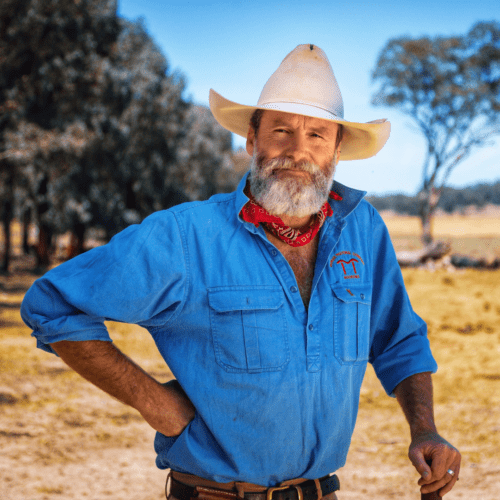
Charlie Arnott
Charlie, an award-winning grazier, educator, and advocate for Regenerative Farming practices, transformed his family’s conventional, high-input farm into a biodynamically managed one, partnering with nature rather than working against it. With a focus on quality and healthy food production, the farm raises animals using organic, biodynamic, and holistic grazing principles, providing clean, nutritious food to its clients.
Charlie emphasises the importance of collaborating with nature, rather than manipulating it, for the health of the farmer, consumer, and land. The farm is transparent, considering its clients as co-producers, and hosts workshops and community events to teach the principles and practices of biodynamics to farmers and families.
Charlie has been recognised with several industry awards for his leadership, resource management, and conservation, including the Bob Hawke National Landcare Award 2018, acknowledging his commitment to caring for the land and sharing knowledge with others.
Charlie is the host of The Regenerative Journey podcast, launched in 2020 with the support of Landcare Australia. The podcast features insightful conversations with inspiring figureheads in the regenerative agriculture movement and beyond. Guests have included notable personalities such as Maggie Beer, John Farris of INXS, Damon Gameau, Charles Massy, Rachel Ward, Neil Perry, and Matt Moran, among others. The show has produced two record-breaking seasons from 1 August 2021 to 31 July 22, and it is currently in its seventh season, with over 750K downloads to date. The podcast was shortlisted for the ‘Best Interview’ category of the 2020 National Podcast Awards and ‘The Climate Award’ in 2021.
In each episode, Charlie guides the listener through his guest’s regenerative journey, discussing topics such as the regenerative agriculture definition, natural capital, the psychology of transitioning to regenerative farming practices, and principles of partnering with Nature.
The podcast targets a curious and engaged audience interested in learning about regenerative agriculture and its wide-ranging and significant benefits, not just for farming communities but for anyone who cares about the planet and wants to understand where their food comes from.
Conference Session One: The Power of Connection – How the Regenerative Journey Podcast is Bringing Together a Global Community of Changemakers
Conference Session Two: Why Regenerative Agriculture Matters – Lessons from My Farming Journey
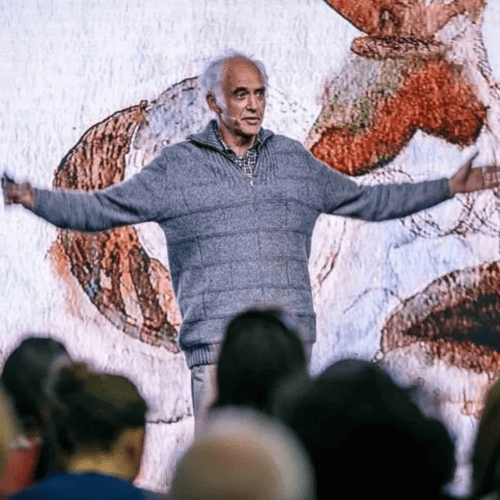
Gary Williams
Gary and his partner Emily live on a small farm where there is a wide diversity of farming and forestry activities, from home gardens and orchards to staple crops, animal grazing, firewood and plantation forests, and wilderness. Their stewardship of this land is guided by the principles of permaculture and the practices and methods of organic and biodynamic agriculture.
Gary is a teacher of permaculture and provides advise and design assistance to people and communities seeking a more resilient and sustaining way of living, which reflects the nature of their place.
Gary has written many articles, as well as books on alternative economics, our understandings about life and the processes of cultural transformation. He has academic qualifications in engineering, physics and economics. Gary works from home as a professional engineer in the field of water and soil resources. His website is — www.waterscape.co.nz
Conference Session: Regenerative Practices for Land and Water
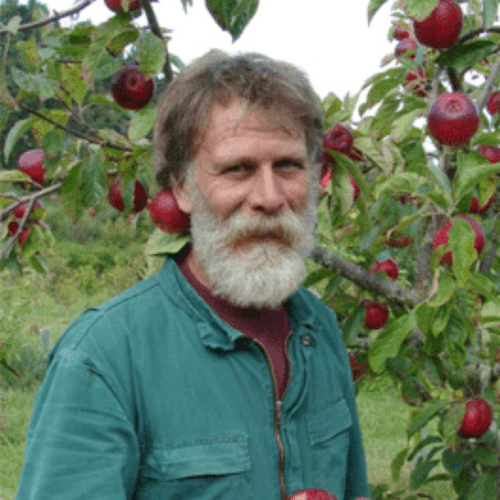
Dieter Proebst
Dieter’s journey in biodynamics and permaculture has spanned 35 years. Dieter first gained a degree in forestry and then moved into permaculture training, which lead to a Diploma in Permaculture Design.
Dieter grew fruit and trees at Treedimensions outside Motueka for over 30 years. He has an immense knowledge of all sorts of topics relating to fruit, farming, bees and forestry, as well as food safety regulations too.
After being a Demeter inspector for nearly 20 years, Dieter now spends his time writing, teaching and doing consulting work.
Conference Session: Permaculture as a Design Framework for Biodynamics – Not one without the other
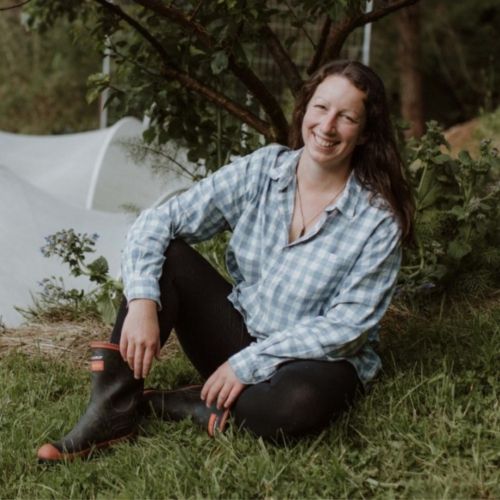
Monique Macfarlane
Holistic food systems facilitator, Monique Macfarlane has a deep affinity for biodynamics. Introduced to the concepts in 2016, it immediately made sense to her as she already had an innate knowing that everything is connected.
She has intimately investigated biodynamics on properties in the Bay of Plenty, Marlborough, and Central Otago, as well as spent time on the Biodynamic Farming and Gardening Association Council here in New Zealand.
Her passion for sharing this knowledge and empowering people back to the land and themselves, has led her to birthing her business Natural Wisdom, which facilitates workshops in biodynamics, planting by the moon, no-dig food growing, seasonal approaches to gardening and self-sufficiency, as well as consulting on various properties nationwide, primarily in assisting transitioning to biodynamics.
Natural Wisdom was born out of the curiosity for knowledge, nature and the human experience. An avid reader and devourer of information, along with an embodied sense of this lifetime, Monique seeks to understand the depths of herself, out to the reaches of the universe, and absolutely everything in between as she explores the interwoven connections in the cosmos.
Currently based on 8ha of family land just outside of Waihi that encompasses a market garden, young orchard, pastoral grazing, free range chickens and agroforestry, that is certified organic and co-created with biodynamic, natural farming, holistic grazing, and no-till principles.
Conference Session: Biodynamics, a journey – The grounding perspective of the interconnectedness of everything
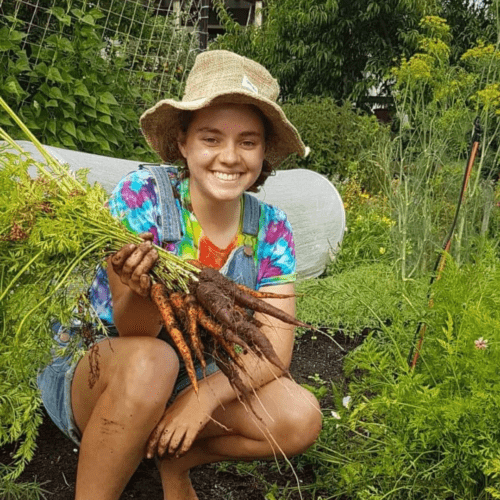
Kaitlyn Lamb
Katilyn’s interest in organics and biodynamics was piqued when she joined the Kaitaki (food guide) of Eat New Zealand. This group connected her to urban farming and composting in Aotearoa, which led her to become a volunteer and then a summer worker at Lux Organics (run by Jenny Lux). Kaitlyn was initially interested and inspired by Katrina Wolff on Instagram with her biodynamic hot compost making, which is how she came to meet the world of biodynamics.
Ikigai Urban Farm is her new project. Ikigai has come to life due to a lack of urban farms and a desire to learn and become more efficient as a market gardener. Kaitlyn has the desire to set up a larger scale urban farm in the future, which she would like to run as a business.
Kaitlyn is a second-year student at The University of Canterbury, studying Geography and French. She works as a compost assistant at the University’s Sustainability Office alongside my twin sister, Jessica. Outside of regenerative growing, she loves tramping and trail running.
Conference Session: Finding my Ikigai – A Young Person’s Journey into Biodynamics
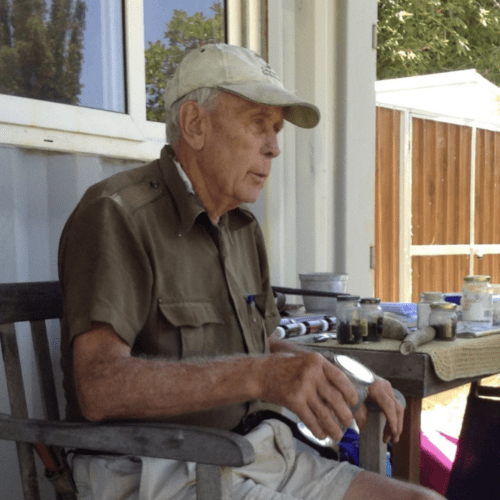
Peter Bacchus
Peter has had a lifelong interest in biodynamics, with his parents being early adopters of biodynamic methods. He has been a dairy farmer, medicinal herb grower and compost maker. Everywhere he goes he makes compost and adds the preparations.
Peter’s wisdom ranges from the practical uses of the preparations all the way through to the cosmic and astrological.
Peter will join Andrew in the session for the exploration of homeopathy.
Andrew Criglington
Brought up on a conventional farm, Andrew had a feeling that things could be better, with more productivity and less damage. He loved the biodynamic idea that most fertility was on the farm, was internal, and didn’t need lots of external inputs. “With no use of chemical fertilisers and poisons, the nontoxic approach was perfect for me,” he says.
He went to university still searching for answers, and found some there. He met an old homeopath who introduced him to homeopathy. Its analytical stance was compatible with his thinking. He trained in commerce and worked in the medical school for years, and ultimately did training in homeopathy.
He developed a homeopathic company and invented many homeopathic complexes, and still runs that business today. “Homeopathy and biodynamics have lots of similarities, so the move from homeopathy to bio dynamics was an easy one,” Andrew says.
Conference Session: How does Homeopathy fit into Biodynamics?
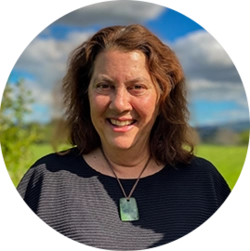
Cathy Tait-Jamieson
Cathy Tait-Jamieson will take a session sharing on the framework of Hua-Parakore and how it fits alongside and complements biodynamic philosophy.
It was back in 1982 when Cathy was first disillusioned with conventional farming. That led her to search for an alternative and she came across some interesting research out of Europe on farming using biodynamic principals. She began working with the Biodynamics Association and Peter Procter visited farm and helped the ‘cold turkey’ conversion across to biodynamics principals at BioFarm which continues today.
It was through biodynamics, working with the cosmos and the relationship with what was under her feet that brought Cathy back to her indigenous roots. She discovered kaupapa maori and tikanga for growing food and farming. She now enjoys working with indigenous knowledge systems.
Conference Session: From Biodynamics to kaupapa Maori – BioFarm – a case study
Post Categories
- Animals
- Bees
- Beginning Biodynamics
- Biodynamic Case Studies
- Biodynamic Preparations
- Biodynamics for children
- Biodynamics in Schools
- Compost
- Cosmic Influences
- Cows + Ethical Calf Raising
- CPP
- Events
- Farm as an Organism
- Featured
- Growing Food
- Harvest Magazine Article
- Hua Parakore
- Latest News
- Nutrition + Food
- Past Events
- Pest Management
- Prep500
- Seasons
- Steiner School
- Stirring + Water + Flowform
- Sustainability + Climate
- Wine
Login Status
Join our newsletter!
Contact Details
E-mail:


